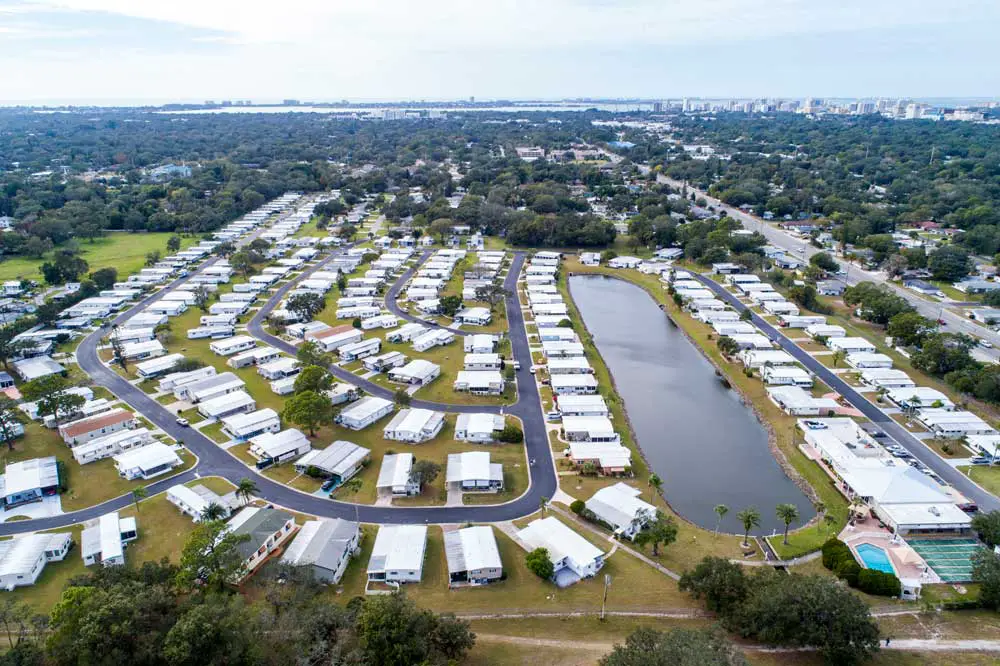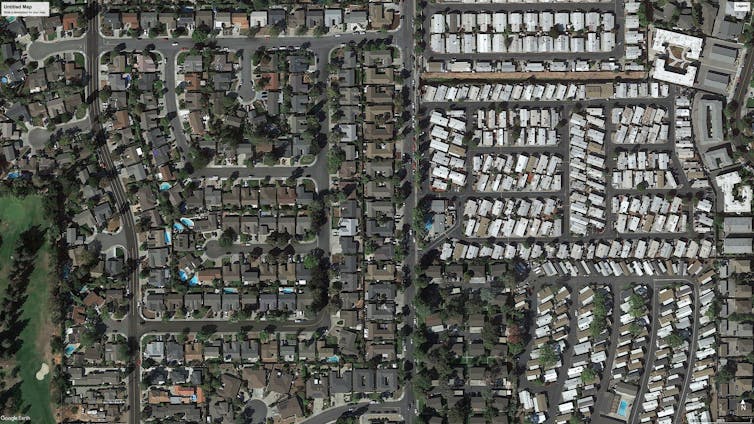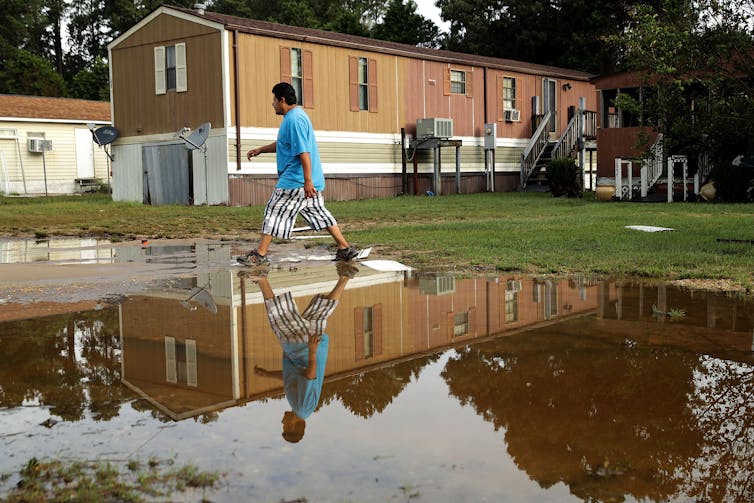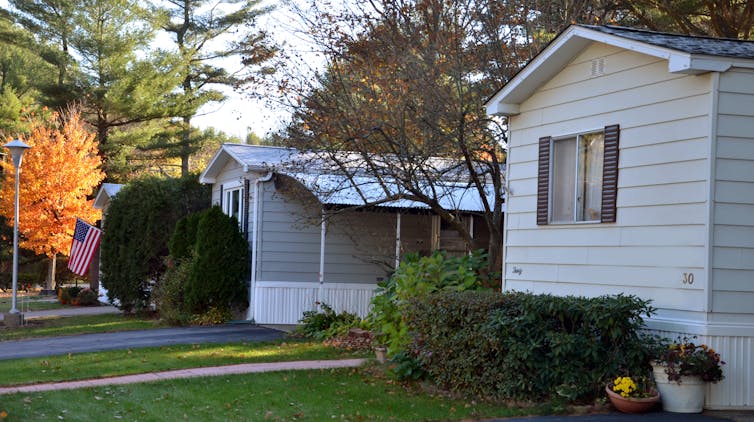
Zachary Lamb, Jason Spicer and Linda Shi
When you hear the words “trailer park” or “mobile home park,” what comes to mind? Crime? Poverty? Vulnerability to natural disasters? These negative images reflect the stigma, reinforced by popular culture, that many U.S. residents assign to manufactured home parks – the official name for these dwellings under federal standards adopted in 1976.
Over 20 million Americans live in manufactured housing – more than in public housing and federally subsidized rental housing combined. Yet many people, including urban planners and affordable housing researchers, see manufactured housing parks as problems. In contrast, we see them as part of the solution to housing crises.
We are urban planning scholars who study climate vulnerability, community economic development and equity in urban land use. Our research suggests that misguided stereotypes blind scholars and policymakers to the possibility that mobile homes can help address the affordable housing crisis and climate change. Here are some misperceptions about this widespread form of housing.
Stereotype 1: Manufactured housing is shoddy
Many people think manufactured homes are poorly built, even though these structures, unlike site-built houses, have had to meet federal safety standards since 1976. These safety standards have been periodically updated, often in response to disasters. Today, new well-installed factory-built homes are comparable to site-built homes when it comes to standing up to wind, fire and other disaster threats.
Compared to homes built on-site, manufactured housing costs half as much per square foot – partly because it’s easier, more predictable and cheaper to build homes in factories. Many quality problems associated with manufactured housing arise from home installation, park maintenance and infrastructure issues. No matter how well-built homes are, residents can suffer if they are installed on unstable foundations, or if park owners allow water, sewer or power utility infrastructure to crumble.
Stereotype 2: Manufactured housing parks are always exploitative
While many manufactured housing residents own their homes, they may not own the land the homes sit on. This can leave them at the mercy of predatory park owners and investors. Moving manufactured homes is difficult and expensive, despite the “mobile” label, so residents of manufactured home parks can’t easily relocate when park owners allow conditions to deteriorate, raise rents or evict residents.
But there are alternatives. Residents at over 1,000 manufactured housing parks in the U.S. have jointly bought their land, creating Resident Owned Communities.
This cooperative model gives residents control over their homes and neighborhoods. Resident-owned parks preserve affordability and help residents address their own problems, including vulnerability to climate-driven disasters.
Stereotype 3: Manufactured housing parks aren’t urban or dense
Manufactured home parks are often dismissed as rural and low-density, and therefore irrelevant to urban housing needs. However, 61% of all manufactured housing is located in a metro area, and 8% is in urban centers.
The density of these communities, typically eight to 15 homes per acre, is often greater than nearby neighborhoods. In Houston, for example, many manufactured housing parks are located in suburban areas close to the central business district. If anything, local zoning in many cities limits the density of manufactured housing parks.

Google Earth, CC BY-ND
Stereotype 4: Manufactured housing parks are uniquely disconnected
Critics often assert that manufactured housing parks are disconnected from surrounding neighborhoods. In reality, this pattern applies to most U.S. residential neighborhoods built since World War II, including gated communities and cul-de-sacs. Residents of these communities value the privacy, safety and neighborhood cohesion their street patterns provide.
Biased local zoning regulations also frequently reinforce manufactured housing parks’ isolation by requiring them to be separated and hidden behind tall privacy fencing. Where fragmented street networks create problems for residents, like reduced walkability, they can be retrofitted by reconnecting streets.
The real challenges
While these stereotypes often don’t reflect reality, manufactured housing communities face real challenges.
Local governments and park owners often are eager to convert parks to what they describe as “higher and better uses,” which frequently means evicting residents for commercial development or more expensive housing. Private equity investors, pension funds and sovereign wealth funds are buying up manufactured housing parks, which they view as reliably profitable investments. When owners redevelop parks, they can evict residents with little recourse.
Residents of manufactured home parks are also increasingly vulnerable to climate change impacts. Biased zoning rules have forced many of these communities to locate on less desirable land, including flood-prone sites, industrial areas and highway fringes. In a 2021 review, we found that 22% of manufactured housing parks across nine states were located within current 100-year floodplains – zones with a 1% chance of flooding every year.
Manufactured housing is especially common in hurricane-prone regions like Florida, Louisiana and Texas. While updated building standards have substantially improved safety, increasingly ferocious storms still pose a real threat.

Chip Somodevilla/Getty Images
Aging manufactured home park infrastructure, including sewer, water and electricity systems, is highly vulnerable to extreme heat, wind, drought, flooding and wildfires. And since residents typically have lower incomes, they have fewer resources to respond when extreme events strike.
Manufactured housing, resilience and justice
With economic, political and technical support, evidence shows that manufactured housing can overcome these challenges.
To date, 20 states have adopted laws that help residents purchase the manufactured home parks where they live. These policies have helped ROC USA, a nonprofit social venture, create a network of over 280 cooperatively owned, limited-equity resident-owned communities that are home to over 18,000 households.
ROC USA provides low-cost loans to resident cooperatives to buy land and make needed capital improvements such as upgrading water, sewer and electric systems. Their network of regional housing experts then works with communities for at least a decade to develop and sustain their ability to manage their parks.
Over three decades, no ROC USA community has ever defaulted on a loan or sold their park. A growing number have adopted climate-responsive measures, such as building storm shelters and community centers, upgrading drainage infrastructure and providing emergency post-storm tree clearance and other forms of mutual aid. Other resident-owned communities are investing in renewable energy and energy efficiency, reducing greenhouse gas emissions and energy costs for their residents.

ROC USA, CC BY-ND
Policymakers are paying attention. The Biden administration’s 2022 housing plan includes extensive support for manufactured housing parks.
California Gov. Gavin Newsom has called for increasing state funding to preserve manufactured housing parks as affordable housing. The U.S. Department of Energy recently adopted more ambitious efficiency standards to reduce energy costs for residents of manufactured housing.
In our view, these efforts should be coupled with legislation that protects manufactured housing park tenants and expands the limited-equity ROC model. Governments could enact laws that offer tenants opportunities to purchase their rental units and provide subsidized loans and grants to resident cooperatives. Decades of experience shows that resident ownership can transform manufactured home parks from sites of stigma and vulnerability into stable and resilient communities.
![]()
Zachary Lamb is Assistant Professor of City & Regional Planning at the University of California, Berkeley. Jason Spicer is Assistant Professor of Geography and Planning at the University of Toronto. Linda Shi is Assistant Professor of City and Regional Planning at Cornell University.





























ULTRA MAGA says
RICH SOBs in Palm Coast would NEVER approve Mobile Home Parks! Palm Coast Roads are NOT being Maintained, more Traffic signals are needed, Olds Kings Highway and White View should be expanded to 4-lanes!
Brian says
No, more traffic lights are not needed until traffic engineers figure out how to time them. White view is my back yard so not happy with making it 4 lanes. But progress is my enemy. And I lived in a mobile home park. No different than living here. You will have assholes and great people. The hope is it equals out.
ULTRA MAGA says
A 4-lane WhiteView from US1 to Belle Terre would be a Safer Highway! White View is already a 4-lane from US1 to WhiteMill. The main problem with PC Traffic signals is that the yellow caution lights are NOT timed the same at every traffic signal!
Mary Fusco says
Ultra, I see nothing wrong with mobile homes if the owners own the land they are on. My parents lived in one in NC after they retired some 30 years ago but they owned the land. These parks have total control. The lot rentals can be astronomical like condo fees that can go up at any time. People can get sucked in with the lower price of the home but the fees will break them. Just a thought.
December says
Thank you for an excellent article about manufactured housing, about time someone did this hopefully to change the stigma about this type of home. Our first home together was a mobile home not because it was what we were looking for, had never been in one, but he was in construction and we were in an area that had just had major flooding (much the same as what is happening in KY now) & there was no other housing to be had. Our home was cute, comfortable and served our needs well, when leaving I sold it for more than we paid 2 yrs prior. IMO it would be a nice thing to turn some of these abandoned overgrown golf courses into such the only thing I would change is that the homes be on resident owned lots and have an on site manager. Just my opinion, for what its worth.
A.j says
Bad stigma is always in this society. We should be used to it. I say if a person want to live in a trailer do be it. Anyway that will always happen. Life goes on, do what you think is right fir you and your family. There will always be people telling you what to do.
James says
Nope, not in FL… never. Talk about livin’ la vida loca.
James says
People can do better today, https://61custom.com/houseplans/minimalist/ they can live their days out with dignity. You don’t need substandard housing… especially here in FL, those days are OVER. They must demand change, they must seek better alternatives and options from the housing industry.
Leila says
What stigma? Have you seen the new mobile homes? They are gorgeous! However, they will never be a safe option where there are tornadoes, hurricanes and other extreme weather. That’s just fact.